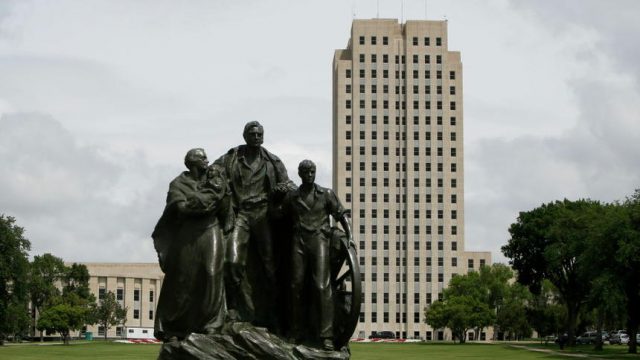In Defense of North Dakota’s Income Tax Cuts

The Pioneer Family stands in front of the North Dakota State Capitol on July 14, 2016, in Bismarck. Michael Vosburg / Forum Photo Editor
North Dakota Democrats have decided to campaign against the income tax cuts our Republican-dominated Legislature implemented in successive sessions from 2009 onward.
The individual income tax rate went from a 1.84 – 4.86 percent range to its current 1.10 – 2.90 percent. The argument from Democrats, now echoed in a recent editorial in the Grand Forks Herald, is that these tax reductions destabilized the state’s budget and made the state more dependent on tax revenues from the volatile oil and gas industry.
“The state relies too heavily on commodities, so the best tax structure requires conservative tweaks and, especially, diversification,” the Herald wrote. “North Dakotans may not like this, but a modest and consistent income tax needs to be part of the equation. Sales taxes, extraction taxes and the like are just too erratic.”
Note that the argument here is not necessarily the missed revenues due to lower income tax rates, but the idea that lower income tax rates make general fund tax revenues less stable.
That’s important to remember as we look at the actual income tax numbers. I asked Insurance Commissioner Ryan Rauschenberger’s office if they had an analysis comparing actual individual income tax collections to what they would have been absent the various rate reductions passed since 2009. As it turns out, they had the numbers (see below) and I turned those numbers into this graph:

Could North Dakota have used that additional revenue over the last couple budget cycles which saw deep cuts to general fund spending? Perhaps. I tend to agree with Governor Doug Burgum and others who argue that North Dakotas problem was spending bloat not revenues. Boom-era budgets were unsustainable. We were always going to have to make cuts.
But the argument made by the Herald is that the income tax reductions destabilized revenues. I would ask, do either of those lines look particularly stable to you?
From peak revenues in 2014 to 2016 income tax revenues under the current code dropped more than $350 million. Had the income tax cuts not been passed, that drop would have been more than $233.2 million.
The volatility exists, whatever the income tax rates.
Our problem isn’t income tax cuts. Our problem is an economy which is too tied to commodity prices. Which is, itself, an argument in favor of income tax reductions.
If we want to attract more people and more investment to our state we must keep taxes low. States like California and New York can tax more because they have advantages – cultural, meteorological, etc. – which our state simply does not. What we can offer is a low tax state with a light regulatory touch.
If we want to get off the commodities roller coaster, a low income tax rate is what we need.
[scribd id=378572658 key=key-xvS44TpkpEBIAXRXmYdm mode=scroll]




